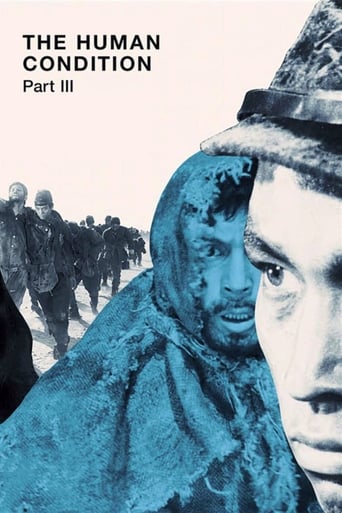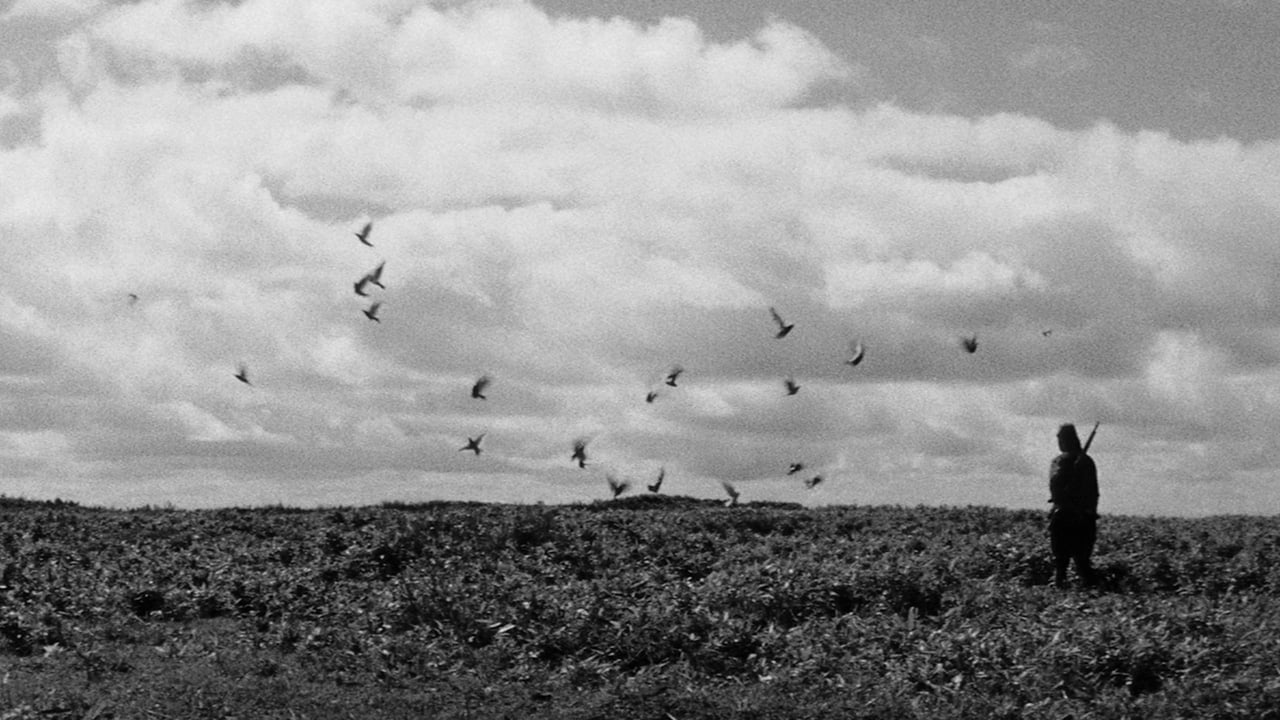mevmijaumau
The Human Condition (Ningen no jôken) is a 9,5 hour long epic film trilogy directed by Masaki Kobayashi, based on the six volume novel by Junpei Gomikawa. The trilogy stays true to the novel's composition by being divided into six parts, meaning that each of the three installments are split in two parts, in between which are intermissions. Both parts in the first film begin with the same opening credits sequence, showing us some stoneworks portraying dramatic imagery (the similar intro opens all three films). The three movies, each long 3 hours or more, are called No Greater Love, Road to Eternity and A Soldier's Prayer.Okay, now, I enjoyed the first film despite some historical inaccuracies. I liked the second movie but it didn't leave much of an impact on me. But this one, A Soldier's Prayer, is just brilliant.Unlike the first two films, ASP is much less repetitive and a lot more diverse stuff goes on. We follow Kaji on his long path to his wife Michiko. First he tries to flee the war zone accompanied by other soldiers and civilians, then they encounter Chinese forces, from which they escape through a burning wheat field. They stumble upon an encampment which gets besieged by the Soviets, after which Kaji ends up as a worker in a Red Army camp, mirroring his position in a Manchurian work camp from the first film. He escapes and meets his doom in a snowy outback, where he dies out of hunger or exhaustion.That's basically the plot, although a lot of other things happen and a lot of characters are introduced. Throughout the film, you feel 100% immersed in every obstacle Kaji faces and that feeling never lets up. Tatsuya Nakadai gives us one of the best, most believable performances I've ever come across (and I don't even think this is his best). Kobayashi: "When I made The Human Condition, most actors at that time were either of prewar or mid-war generations. I was looking for a person who could convey the feeling of the new generation. Nakadai was able to convey this new, strong, energetic side of postwar youth."Of course the supporting cast is great too, and there are even some big names accompanying the unknown portion of the cast. There's Kyoko Kishida as Ryuko, Chishu Ryu as the man in the encampment and Hideko Takamine as the unnamed woman who's also situated there.The cinematography is even better than in its two predecessors; some shots from this movie you'll remember for a long, long time - Kaji standing by a huge field with scavengers flying around, him being interrogated at the Soviet work camp HQ and finally getting stranded in the middle of nowhere for example. It's interesting to note that the first two films begin with a snowy scene, while the third movie ends with one.The trilogy doesn't take any sides as far as nations themselves are concerned and even portrays the Japanese military in an unbelievably negative light for the time it was released. It's an universal anti-war film that brilliantly concludes the trilogy. Kobayashi also argued against the militaristic system while he was in the army, which must be why he later said: "I am Kaji."Kobayashi: "I spent four years making The Human Condition. While making it, I received many letters from people requesting me not to let Kaji die in the end. I had considered that possibility, but to me, his death was actually a resurrection. He had to die there. With his death, he lives in the minds of people for a long time, as a symbol of the hope that we can eradicate the human tragedy of war."Kaji's beliefs are often challenged and inverted throughout the trilogy. According to the director, he said he wanted to portray the tragic dual nature that the Japanese people experienced back then.
OttoVonB
And the epic saga continues
.Read this only after the reviews for parts one and two. There won't be any spoilers but the review will make more sense.Having survived the near-total extermination of his unit at the end of Part II, Kaji (Tatsuya Nakadai) wanders through war-torn China with a group of hopeless survivors. Everyone they encounter deals with defeat and despair in their own way.It all comes to an end with style, though that style is bleaker and more episodic than either of the previous chapters. The great tragedy of Kaji's life is that the closest he comes to being free of the horrors of war, the further he is – geographically speaking – from the only thing he truly wants: reunion with his loving wife. This detail gives the film, in many ways your standard squad war film, an important extra dimension it would never have had as a stand-alone piece. After about 10 hours in 3 films, Kobayashi has given us a POW drama, a character study about duty VS dignity, a war film that crushed Full Metal Jacket, a roaming war-set nightmare that rivals Apocalypse Now, all wrapped up in an uncompromisingly humanist masterpiece. You will feel exhausted by the end of this, physically – 10 hours of straight cinema-scope horrors takes a toll on the eyes – and mentally. But it is undoubtedly one of the mind-expanding works of film, and one of the greatest tragedies ever put to the screen.If you'd ever wondered, now you know what cinema's answer to Hamlet looks like.
MartinHafer
This is the third film in "The Human Condition" trilogy--a series of films that follow the very idealistic Kaji through WWII. At first, he believes strongly in the goodness and value of ALL people--putting him at odds with the xenophobic Japanese who see non-Japanese as subhuman. In the first film, Kaji is sent to oversee production at a forced labor camp where his humanitarian treatment of prisoners runs afoul of the militarists. By the end of the film, Kaji is not only removed from this job but inducted into the military.In the second film, he's in boot camp for much of the film and is frequently brutalized for his socialist views. By the end of the episode, it's the final days of the war and most of his unit is wiped out by Russian troops.Here in the third film, it picks up with Kaji and two other soldiers wandering about--trying to find food and civilization. Along the way, they meet up with other Japanese on the run and through the course of the film, most of the Japanese lose their humanity--thinking only of themselves and their baser instincts. However, Kaji is STILL an idealist--but he's finding it harder and harder to stick to these values as those around him degenerate like animals.Unfortunately, after struggling with hunger and exhaustion to try to find his way home, Kaji and his men are captured by the Russians and are sent to a work camp. There, in an ironic twist, Kaji learns firsthand what his workers in the first movie experienced. He's beaten, starved and treated like dirt. His socialist philosophy is finally broken when he realizes that Stalinist Russia is NOT a friend to the people--and it sucks just as much as any other lousy nation. He then escapes, wanders about and dies! Ultimately, the three films are about 10 hours of length and are an indictment of both the Japanese militarism as well as debunking the notion that humanity is universal. No, instead, war is useless and folks degenerate to their basest instincts. It's all very, very depressing and jaded--which isn't the least bit surprising for Japan during the 1950s--when lots of other great anti-war films debuted about the same subject matter--such as "Burmese Harp" and "Fires on the Plain". "The Human Condition" is great for its thoroughness and style, though I think the other two films are better since they are more concise--and, if anything, MORE negative in their depiction of war. Well worth seeing---just make sure you have a HUGE block of time to see it.
ekeby
I disagree with the other reviewer here; I think you can see these three movies individually, although you must see them in the correct order. To see all three in one sitting strikes me as something that might almost be impossible, not just physically, but emotionally.It is beyond me how these films escaped my attention all these years--I'd only become aware of them recently. Clearly, this trilogy is one of the great film achievements of all time, right up there with Eisenstein and Fellini. Never mind that the message of the films is overwhelming emotionally--the sheer technical achievement of making them is almost beyond my comprehension. The cinematography is first rate all the way through--the acting is the best you'll ever see. You are not watching a movie, you're sharing the experiences of people in impossible situations.Don't read reviews, don't even read the DVD box (as I did on the first one) because you may encounter spoilers. This is one experience you do NOT want to have spoiled. Just be aware this is very serious fare, it is a drama in every sense of the word. There are moments of incredible tenderness, but there is absolutely nothing to laugh at--there is NO comic relief of any kind. it is deadly serious all the way through.I wasn't particularly eager to watch Human Condition because, knowing the plot summary, it sounded like too much of a downer. Yes, the subject is depressing, but great art is uplifting. This is great art.


 AD
AD

